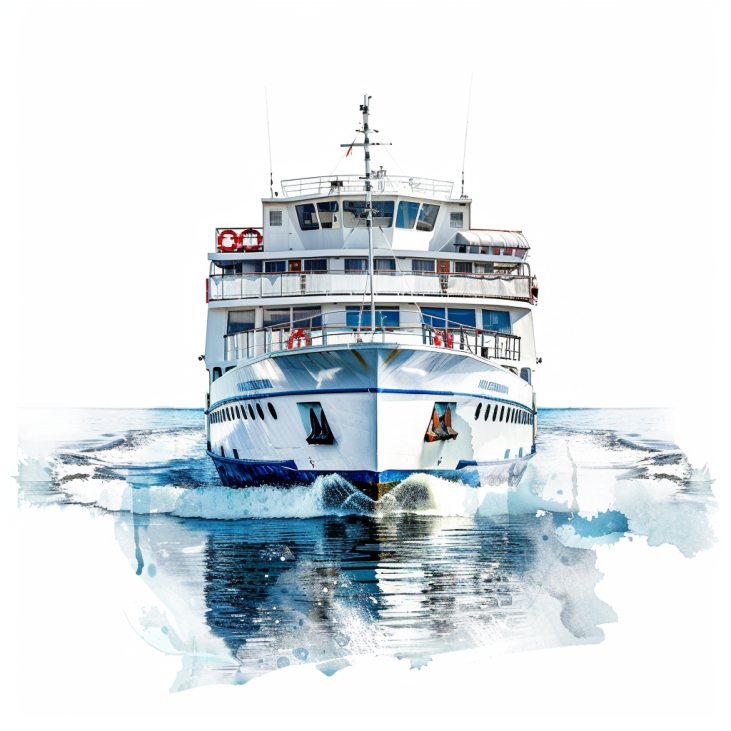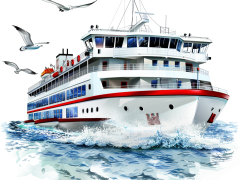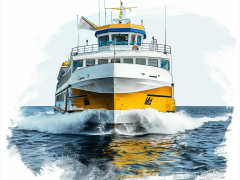
When it comes to getting from point A to point B in Europe, ferries often get overlooked in favour of planes, trains, and buses. However, there are several compelling reasons why you should consider incorporating ferry travel into your European adventures:
Cost Savings
One of the biggest draws of ferry travel is the significantly lower cost compared to other forms of transportation. Flights and high-speed trains can eat up a huge chunk of your travel budget, but ferries provide a much more affordable alternative. Depending on the route and operator, you can often find ferry tickets for a fraction of the price of other options.
Scenic Routes
Many ferry routes in Europe take passengers through some of the most breathtaking coastal landscapes and waterways. From the rugged cliffs of the English Channel to the serene fjords of Norway, travelling by ferry allows you to soak in stunning vistas that you simply can’t experience from the window of a plane or train. It’s a great way to appreciate the natural beauty of the continent.
Flexibility and Convenience
Ferries tend to offer more flexibility than other modes of transport. You often have the option to bring your own vehicle, which can be especially handy if you’re planning a multi-destination road trip. And with ferries running on regular schedules, it’s easy to weave them into your overall travel itinerary.
On-Board Amenities
Modern ferry vessels are equipped with a range of amenities to make your journey more comfortable and enjoyable. Many offer on-board restaurants, cafes, shops, and even entertainment options like cinemas and casinos. Some even have cabins if you want to catch some shut-eye during an overnight crossing.
Reduced Environmental Impact
Compared to air travel, ferry transport has a significantly lower carbon footprint. This makes it a more eco-friendly choice for the environmentally conscious traveller. Plus, with no need to wait in lengthy airport security lines, you can reduce your overall travel time and emissions.
Top Cheap Ferry Routes in Europe
Now that we’ve covered the benefits of ferry travel, let’s dive into some of the most budget-friendly routes and operators to consider for your next European adventure.
English Channel Crossings
One of the most well-known ferry routes in Europe is the English Channel, which connects the UK with France, Belgium, and the Netherlands. Popular operators like P&O Ferries, DFDS, and Brittany Ferries offer crossings from ports like Dover, Calais, and Dunkirk, with fares starting as low as £15 one-way.
Baltic Sea Connections
Travelling between Scandinavia, the Baltics, and Northern Germany? Ferries are an excellent option for navigating the Baltic Sea. Operators like Stena Line, TT-Line, and Viking Line connect cities like Stockholm, Helsinki, Tallinn, and Rostock, with prices often under €50 per person.
Mediterranean Island Hopping
For those looking to explore the stunning islands of the Mediterranean, ferries provide an affordable way to island hop. Cheap ferry services connect mainland Spain, Italy, and Greece with islands like the Balearics, Sicily, and the Greek Isles, with fares starting around €30-50 one-way.
North Sea Crossings
Traversing the North Sea between the UK, the Netherlands, Germany, and Scandinavia? Companies like DFDS, Stena Line, and Fjord Line operate a variety of ferry routes, with prices typically ranging from £30-100 per person.
Ireland-UK Connections
Hopping between Ireland and the UK is a breeze with the many ferry options available. Operators like Irish Ferries, P&O Ferries, and Stena Line connect ports like Dublin, Rosslare, and Belfast with destinations in Wales, England, and Scotland, with fares often under £50 one-way.
Tips for Planning Cheap European Ferry Travel
Now that you’ve got a sense of some of the top ferry routes in Europe, here are some essential tips to help you plan an affordable and seamless ferry-based adventure:
Book Early
As with any mode of transport, booking your ferry tickets well in advance can lead to significant savings. Many operators offer early-bird discounts, so try to secure your tickets a few months before your travel dates.







